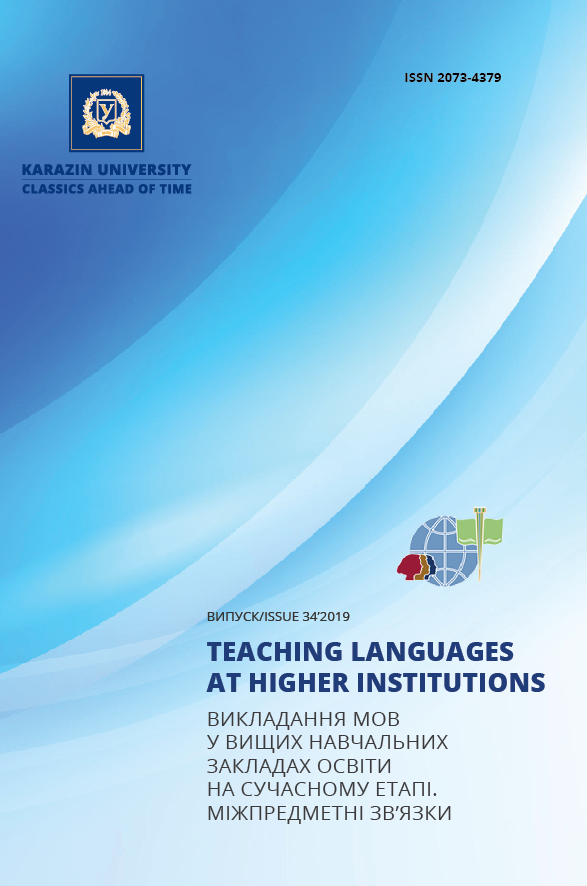The peculiarities of teaching the language of learning to foreigners at the third level of higher education
Abstract
The article highlights the peculiarities of teaching the language of learning to foreigners at the third level of higher education, which involves obtaining certain knowledge, skills, sufficient for conducting scientific research while taking a post graduate course. The communication needs and specificity of cognitive activity of graduate foreign students have been described. Teaching the language of foreign graduate students is based on the study of scientific speech, which serves the field of modern scientific activities and serves to convey objective information about the world around. The specificity of the scientific style of speech is determined by the peculiarities of the way of thinking under lying this functional style and the peculiarities of communication in the scientific sphere, the characteristics of which are objectivity, uniqueness, clarity, accuracy, logic, which can be the hallmarks of style at all its linguistic levels. Features of the scientific style of speech at the lexical and syntactic levels (deaganality, polyproposability, complexity of syntactic structures) have been considered. The genres of scientific speech (articles, dissertation, abstracts, abstract, annotations in written and oral speech speeh) and types of texts on the basis of which the training of the professional language of the specified contingent of students have been conducted. The place of abstract reading in the system of language teaching of post graduates have been considered. Abstract reading combines research and information activities and is the main type of reading while conducting scientific research, since it is directly implemented during the scholar's current state of the subject under study, the definition of a range of outstanding issues, and helps producing an informative message about the course of his own scientific work. The content for all education (report, participation in discussions) and written (writing informative and indicative abstracts, annotations, summaries, compilation of bibliographic description and list of literature) of speech at the third level of higher education have been described.
Downloads
References
Duhanina, N.M. (2018). Osoblivosti navchannya inozemnih mov zdobuvachiv vishoyi osvity stupenya doktora filosofiyi [Peculiarities of studying foreign languages of applicants at the higher education level of the Doctor of Philosophy]. Young Scientist [Young Scientist], 4 (56), pp. 489–492 [in Ukrainian].
Gapochka, I.K. (1981). Celi i soderzhanie referativnogo vida chteniya na russkom (inostrannom) yazyke [The objectives and content of the abstract type of reading in Russian (foreign) language] Prepodavanie russkogo yazyka aspirantam-inostrancam [Teaching Russian to foreign graduate students]. Mоscow: Nauka, pp. 28–35. [in Russian].
Kapustina, N.A. (2012). Osobennosti raboty s nauchno-publicisticheskim tekstom v gruppah aspirantov, izuchayushih russkij yazyk [Features of work with the scientific and journalistic text in groups of graduate students studying the Russian language]. Available at: iling-run.ru/library/sborniki/for_lang/2012_04/15 [Accessed Mach 15, 2019] [in Ukrainian].
Kirsho, S.M. and Shilofost, N.M. Formirovanie professionalno-znachimyh lingvisticheskih kompetencij v sovremennom uchebnom posobii po RKI [Formation of professionally significant linguistic competences in a modern textbook on RCTs]. Available at: enpuir.npu.edu.ua/bitstrim/123456789/15757/1 [Accessed Mach 16, 2019] [in Ukrainian].
Lariohina, N.M. (1989). Obuchenie grammatike nauchnoj rechi i vid yuprazhneni [Learning grammar of scientific speech and types of exercises]. Mоscow: Russkiy yazyk [in Russian].
Mets, N.A., Mitrofanova, O.D. and Odincova, T.B. (1981). Struktura nauchnogo teksta i obuchenie monologicheskoj rechi [The structure of the scientific text and learning monologue speech]. Mоscow: Russkiy yazyk [in Russian].
Postanova Kabinetu Ministriv Ukrayini “Pro zatverdzhennya Poryadku pidgotovki zdobuvachiv vishoyi osviti stupenya doktora filosofiyi ta doktora nauk u vishih navchalnih zakladah (naukovih ustanovah)” vid 26 bereznya 2016 roku [Resolution of the Cabinet of Ministers of Ukraine “On Approval of the Procedure for Preparing Graduates of Higher Education in the Degree of Doctor of Philosophy and Doctor of Science in Higher Educational Institutions (Scientific Institutions)” dated March 26, 2016]. (2016). Available at: kmu.gov.ua/control/uk/cardnpd/docid=248945529 [Accessed Mach 10, 2019] [in Ukrainian].
Ushakova, N.I. (2009). Pro vidpovidnist program iz movnoy ipidgotovki inozemnih studentiv yevropejskim kompetenciyam volodinnya inozemnoyu movoyu [On correspondence of programs on language training of foreign students to European competences of foreign language proficiency]. Vykladannja mov u vуshhikh navchal'nуkh zakladakh osvіty na suchasnomu etapі. Mizhpredmetni zvyazky [Present-day Teaching Languages at Higher Educational Institutions. Intersubject Connections] Kharkiv: V.N. Karazin Kharkiv National University, 14, pp. 225–235 [in Ukrainian].
Vasileva, A.N. (1981). Prakticheskaya stilistika russkogo yazyka dlya inostrannyh studentov-filologo starshih kursov [Practical stylistics of the Russian language for foreign students-philologists of senior courses]. Mоscow: Russkiy yazyk [in Russian].

